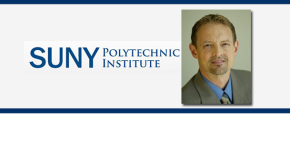
Do news media corporations actually function with eyes wide open?
Robert Edgell, professor of technology management at SUNY Polytechnic Institute, examines this question.
Dr. Robert Edgell is an Assistant Professor of Technology Management at SUNY Polytechnic Institute and a Visiting Professor at the Swiss Business School in Zurich. Previously, he was a professor at American University’s Kogod School of Business and has taught at San Francisco State University’s College of Business.
His current scholarly research focuses on a range of interdisciplinary topics including media as a lever for corporate governance, responsible innovation and harm (in collaboration with colleagues from Stanford University Law School), top management team creativity processes, and entrepreneurial social impact.
Dr. Edgell received his Ph.D. in international multicultural management (magna cum laude) from the University of St. Gallen (AACSB accredited). He holds an MBA fromColumbia University Business School in the City of New York and a Bachelor of Architecture (5 year degree, cum laude) from Kent State University. Through Columbia’s Chazen Institute of International Business, he studied at the Rotterdam School of Management in The Netherlands. He is a registered architect and has studied at Harvard’s Graduate School of Design.
Media and Governance
It has been commonly understood that media, in its news role as a “watchful eye”, is essential for the healthy functioning of societies and markets. In this view, commercial news firms have internal controls that supposedly safeguard them from undue influence. Therefore, they should be able to freely investigate both governmental and industry practices with the intent to disclose irregular, illegal, and unethical behaviors.
However, we questioned this assumption and sought to better understand how news firms are managed. We wanted to learn if they are governed in ways that empower them to be objective and independent so that they may truly function with “eyes wide open”.
Our analyses of two media corporations revealed that both lacked the necessary robust prerequisites and processes to fully ensure open, transparent, and effective governance. We found only partial evidence that these firms complied with widely accepted corporate governance best practices and norms. In contrast, these firms exhibited signs of weak stakeholder engagement and fragmented governance practices.
We concluded that these media firms, perhaps challenged by internal pressures and dependencies on revenues from non-media firms, may risk having “one eye blind”. Sadly, they may not have the best “eyesight” needed to help society and markets be more accountable.
